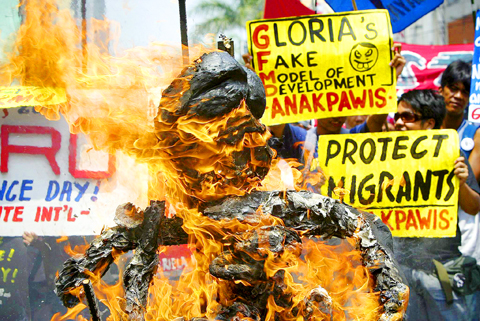Australia will launch a multimillion dollar international carbon capture and storage institute to fight global warming, Australian Prime Minister Kevin Rudd announced yesterday.
Rudd said the plan would be the centerpiece of his address to the UN General Assembly in New York next week, adding that British Prime Minister Gordon Brown had already offered his support.
The institute would promote research and investment to help meet a G8 commitment to have at least 20 industrial scale carbon capture and storage (CSS) projects in operation by 2020.

PHOTO: EPA
CSS involves capturing carbon dioxide as it is released into the atmosphere, compressing it and then pumping it into depleted oil and gas fields or other safe underground chambers.
Carbon dioxide and other greenhouse gases blamed for global warming are produced by burning fossil fuels, and Rudd said Australia is the world’s largest exporter of coal.
Any effective solution to climate change must deal with clean coal and CSS could be a large part of the solution, he told a news conference.
“We the government want this global carbon and storage institute in Australia to be the global go-to place across the board for clean coal technologies and their application. That is the ambition,” he said.
“Rather than simply put an idea out there, we have decided that we need to have some skin in the game [make a significant investment],” he said.
“So we will be providing up to A$100 million [US$80 million] a year to fund this global carbon capture and storage institute,” he said.
Rudd said CSS had the potential to capture 9 billion tonnes of carbon by 2050, about 20 percent of the reduction needed to cap atmospheric levels at 450 parts per million.
There are just five pilot projects worldwide, including one in Australia’s Victoria state.
Rudd, whose first act when he took office last year was to ratify the Kyoto Protocol on global warming, said there was a danger the G8 ambition would end up as simply a politically pious statement.

BOMBARDMENT: Moscow sent more than 440 drones and 32 missiles, Volodymyr Zelenskiy said, in ‘one of the most terrifying strikes’ on the capital in recent months A nighttime Russian missile and drone bombardment of Ukraine killed at least 15 people and injured 116 while they slept in their homes, local officials said yesterday, with the main barrage centering on the capital, Kyiv. Kyiv City Military Administration head Tymur Tkachenko said 14 people were killed and 99 were injured as explosions echoed across the city for hours during the night. The bombardment demolished a nine-story residential building, destroying dozens of apartments. Emergency workers were at the scene to rescue people from under the rubble. Russia flung more than 440 drones and 32 missiles at Ukraine, Ukrainian President Volodymyr Zelenskiy

‘SHORTSIGHTED’: Using aid as leverage is punitive, would not be regarded well among Pacific Island nations and would further open the door for China, an academic said New Zealand has suspended millions of dollars in budget funding to the Cook Islands, it said yesterday, as the relationship between the two constitutionally linked countries continues to deteriorate amid the island group’s deepening ties with China. A spokesperson for New Zealand Minister of Foreign Affairs Winston Peters said in a statement that New Zealand early this month decided to suspend payment of NZ$18.2 million (US$11 million) in core sector support funding for this year and next year as it “relies on a high trust bilateral relationship.” New Zealand and Australia have become increasingly cautious about China’s growing presence in the Pacific

Indonesia’s Mount Lewotobi Laki-Laki yesterday erupted again with giant ash and smoke plumes after forcing evacuations of villages and flight cancelations, including to and from the resort island of Bali. Several eruptions sent ash up to 5km into the sky on Tuesday evening to yesterday afternoon. An eruption on Tuesday afternoon sent thick, gray clouds 10km into the sky that expanded into a mushroom-shaped ash cloud visible as much as 150km kilometers away. The eruption alert was raised on Tuesday to the highest level and the danger zone where people are recommended to leave was expanded to 8km from the crater. Officers also

ESPIONAGE: The British government’s decision on the proposed embassy hinges on the security of underground data cables, a former diplomat has said A US intervention over China’s proposed new embassy in London has thrown a potential resolution “up in the air,” campaigners have said, amid concerns over the site’s proximity to a sensitive hub of critical communication cables. The furor over a new “super-embassy” on the edge of London’s financial district was reignited last week when the White House said it was “deeply concerned” over potential Chinese access to “the sensitive communications of one of our closest allies.” The Dutch parliament has also raised concerns about Beijing’s ideal location of Royal Mint Court, on the edge of the City of London, which has so